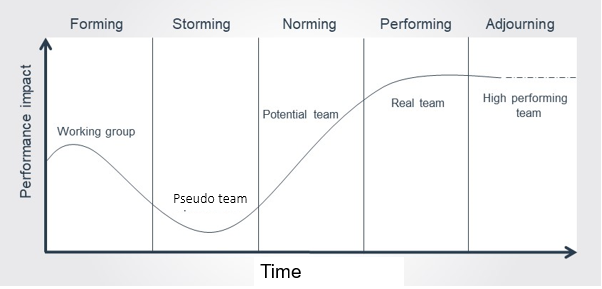Stages of team developement
1/8
There's no tags or description
Looks like no tags are added yet.
Name | Mastery | Learn | Test | Matching | Spaced | Call with Kai |
|---|
No analytics yet
Send a link to your students to track their progress
9 Terms
What are the stages of group developement
•Forming
•Storming
•Norming
•Performing
•… and Adjourning (or mourning, or transforming)
Forming
•New team needs to be organised and will concern itself with organisation
•Individual members are assessing who is in the team and what are their tasks
•Team will very much look to the team leader for guidance
•Individuals possess an innate desire to be accepted by others and avoid conflict
•Team members can feel insecure
•Important that the leader trusts the team members and discusses with the team the expectations of them
Storming
•Team becomes more close-knit and members gain each other's trust
•Opinions are voiced as conflicts arise
•Individual personalities, ideas and perspectives emerge
•Some have a fear of being excluded from a group and are still hesitant to voice their opinions
•Patience can be tested and minor confrontations arise
•Battles ‘won’ or ‘lost’; within accepted rules
•Team leader is important in guiding the team through this difficult translational stage
•A good team leader will encourage members to speak freely and to be open-minded
•Some members may ‘storm’ whilst others still ‘form’
Norming
•Team starts to work in a fulfilling manner
•Criticism no longer taken personally but considered constructive and task orientated
•Team members open to each other’s ideas
•‘Rules of engagement’ established and adhered to
•Group’s tasks become clear & agreed
•Confrontation has led to better mutual understanding of each other’s skills & experience
•Team starts to develop its own identity
•A cohesive effective group feeling emerges
•Getting to this stage may have been an effort and so there may be resistance to change
Team leader gives more autonomy to team members
Performing
•Team functions as a unit and the energy of the group benefits the task
•Everyone knows what is expected of them and works together to reach goals and objectives
•Group understanding and mutual trust
•Strong sense of group identity and loyalty with high morale
•Team functions excellently and capable of making independent decisions
•(This stage might not be reached!)
Adjourning
•Tasks are completed and the team can be dissolved
•Some experience anxiety and do not want to let go of the group
•Some start to distance themselves anticipating the end of the team
•Time to move on – hopefully with a job well done
•A good team leader will often mark this occasion in some way
Tuckman stages of group development
